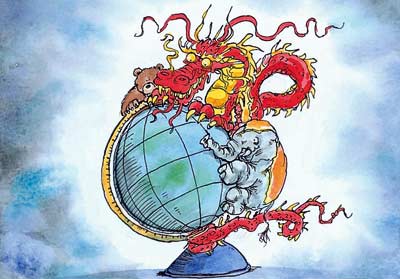Emerging economies are gobbling up world GDP
 This week's issue of The Economist reports how emerging economies are accounting for a larger and larger chunk of world GDP. In two articles the magazine tries to convince us that this development is for the better as long as the developed economies are capable and ready to adapt. See the leader Coming of age as well as the bigger article Climbing back (both walled for non-subscribers).
This week's issue of The Economist reports how emerging economies are accounting for a larger and larger chunk of world GDP. In two articles the magazine tries to convince us that this development is for the better as long as the developed economies are capable and ready to adapt. See the leader Coming of age as well as the bigger article Climbing back (both walled for non-subscribers).
Let us look at and evaluate the arguments ...
The Economist describes three trends proving that emerging economies (notably Russia, India, and China) truly are forces to be reckoned with and perhaps they are even on the brink to surpass the developed countries.
"Thee striking facts highlight the dramatic shift in recent years in the relative economic balance of “first-world” and “third-world” economies."
1. "Last year (...) emerging economies produced slightly more than half of world output measured at purchasing-power parity."
2. "(...) they also accounted for more than half of the increase in global GDP in current-dollar terms."
3. "(each of) the 32 biggest emerging economies, which we track weekly in The Economist and Economist.com, grew in both 2004 and 2005."
The perspective taken by The Economist is an important one; if emerging economies are growing this rapidly should we then see it as a zero-sum game in which they grow on the expense of rich developed countries slumbering off with old populations or should we see it as a positive-sum game where we are all getting richer as result of a growing global potential output?
The Economist is in its usual optimistic corner and goes for the positive-sum solution and I tend to agree with them.
"But rich countries will gain more than they lose from the enrichment of others. Fears that the third world will steal rich-world output and jobs are based on the old fallacy that an increase in one country's output must be at the expense of another's." (...) "Emerging economies' spurt is boosting global output, not substituting for growth elsewhere. Their vim is fuelling growth in the rich world just when greying populations might otherwise cause it to slow (...)"
One concrete example of the emerging economies' effect is on the financial markets where I believe (and others as well :)) that cheap consumer goods pouring out from countries such as China has helped kept inflation at bay and thus permitted central banks to hold interests low. But there are other benefits as well ...
"As a result of China, India and the former Soviet Union embracing market capitalism, the global labour force has doubled in size. To the extent that this has made labour more abundant, and capital relatively scarcer, it has put downward pressure on wages relative to the return on capital."
So is it all good then ? Well, no it is not but this Economist report is actually very balanced as it points to two issues pertaining to the rise of emerging economies.
1. Governments in developed countries have to adapt; "The intensifying competition from emerging economies makes flexible labour and product markets even more imperative, so as to speed up the shift from old industries to new ones. That is why Europe and Japan cannot afford to drag their heels over reform or leave workers ill-equipped to take up tomorrow's jobs."
2. (and most importantly) ... How sustainable is this growth of emerging economies? Here The Economist has some points well made. "This favourable environment cannot last: interest rates are rising, and American consumers cannot keep spending more than they earn. Emerging economies' energy-intensive heavy industries are also vulnerable to high oil prices."
So all in all a well balanced analysis by The Economist this time with which I pretty much agree.